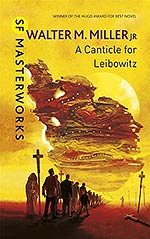
![]() BigEnk
BigEnk
4/2/2025
![]()
A fix up novel of three parts that describe the history of a monastery in desert, dedicated to the patron saint Leibowitz. Leibowitz was an engineer by trade, at least before a nuclear apocalypse, who dedicated himself to the saving and storage of scientific and mathematical volumes, which were intended to be carried through the coming age of darkness. The monks have tasked themselves with the safe-keeping of these documents, and with their distribution to the right people once humanity has found its footing again. Throughout the course of the book, human return to their previous level of technological prowess, and the meaning of the monastery is tested.
An incredibly intelligent and thought-provoking novel, that is different than any other SF novel that I've read this year, both in terms of perspective and content. Miller Jr was a devoted catholic, a fact that could not be more clear from simply reading the book. Catholic ideology, morals, practices, and history are the backbone of the book, and if that doesn't sound like a good time to you, then it probably won't be. I was surprised by how much I enjoyed it myself, even coming from a secular background. I think this book needs to be read carefully, line by line, to get the most from it. It can be a challenging read at the best of times. Even then, with the amount of Latin used, it can sometimes be hard to infer the full meaning, and looking things up on google every few paragraphs can take you out of the flow.
A Canticle for Leibowitz is often slow, but never ploddingly so. The titular characters of each section are well-drawn and human. I don't think this is light beach-read by any means, but it's far more readable than I anticipated. Miller clearly put a lot of effort into writing the book, and the prose reflects that work. There's even passages written in almost biblical style, which were often beautiful.
The three separate parts speak a little differently, but they all work in their own ways, just not to the same degree. The book begins with more humor than I was expecting, as Miller Jr pokes fun at some Catholic sayings and practices, but slowly becomes more somber and dark as the novel progresses. My only major point of contention is that the final third of the book starts to feel overly preachy, that Catholic ideals are simply better than those of the secular world. The prior two sections were more of a conversation about how religion and science need each other, how they both play a role in humanities 'ideal' society. Miller Jr treads a very fine line gracefully, but slips up towards the end.
Miller Jr's main argument is that because of the human condition, without religion, the tools that science provides mean that we are bound into a cycle of destruction and regrowth, never to escape. The morals and values that the Catholic faith provides us deserve a rightful place of priority over technological advancement. The values that the book upholds feel as though they are coming from an educated and genuine place, and while I don't know that I agree with ever one of Miller Jr's points, I don't feel I need to.
It's really quite hard to capture all of the depth of meaning, symbolism, and theming at play here. I do think it's a seminal and masterful work that is a standout in the genre.